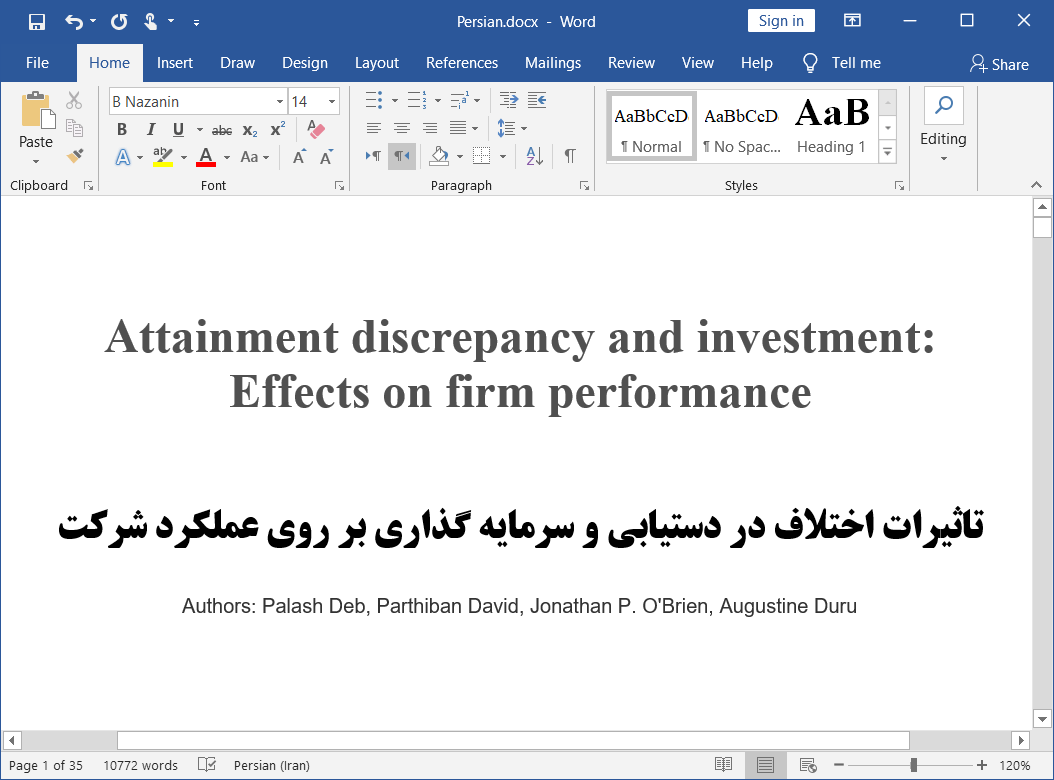اثرات تفاوت در دستیابی و سرمایه گذاری بر عملکرد شرکت


19,500 تومانشناسه فایل: 13504
- حجم فایل ورد: 336.6KB حجم پیدیاف: 557.2KB
- فرمت: فایل Word قابل ویرایش و پرینت (DOCx)
- تعداد صفحات فارسی: 33 انگلیسی: 11
- دانشگاه:
- K-503, New Academic Block (NAB), Indian Institute of Management Calcutta, Diamond Harbour Road, Joka, Kolkata 700104, India
- American University, 4400 Massachusetts Ave NW, Washington, DC 20016-8044, United States of America
- Management Department, College of Business Administration, University of Nebraska-Lincoln, United States of America
- ژورنال: Journal of Business Research (8)
چکیده
اگرچه در نظریه رفتاری شرکت فرض میشود که ضعف عملکرد،جستجوی مشکل محور [problemistic search] را تحریک میکند، اما نتایج واقعی عملکرد جستجوی مشکل محور به صورت یک سوال بی پاسخ باقی می ماند. ما ادعا میکنیم که مکانیزم های شناختی، عاطفی و رفتاری تحریک شده توسط ضعف عملکرد، مدیران را آگاه تر، با دقت تر، و منظم تر می سازد و این منجر به انطباق، یادگیری و افزایش ارزش شرکت می گردد. بعلاوه تفاوت در «میزان حس کردن مدیران برای تحت فشار بودن برای انطباق» (و داشتن توانایی برای وفق دادن)، میتواند آگاهی، انگیزه و توانایی های مدیریت، و (بنابراین) ارزش های شرکت را شکل دهد. تحلیل تجربی ما – با استفاده از داده هایی برای یک نمونه از شرکت های تولیدی آمریکا (1994-2013) – تأیید می کند که جستجوی مشکل محور سبب افزایش ارزش شرکت می شود و زمانیکه شرکت با فشار بیشتری برای انطباق یا داشتن توانایی بیشتری برای انطباق روبرو می شود، این رابطه قوی تر می شود.
مقدمه مقاله
الگوهای انتخاب منطقی در اقتصاد پیشنهاد میکنند که مدیران سرمایه گذاری های استراتژیکی بر روی حساب بیشینه سازی منطقی سود انجام دهند و بنابراین بازخورد عملکرد را با تخصیص منابع و تغییر در سازمان، غیرمرتبط بدانند. برعکس، مطالعات زیادی درباره نظریه رفتاری شرکت (BTF) اختلافاتی را در دستیابی (یعنی عملکرد پایین تر از انتظار) بعنوان محرک اصلی سرمایه گذاری استراتژیکی نشان میدهد (گریو 2003 الف)، و فرض میکند که بازخورد منفی توجه ما را به مشکلات جلب میکند و مدیران را ترغیب میکند که جستجوی مشکل محور را برای راه حل ها انجام دهند، با این هدف که بتوانند شکاف موجود بین عملکرد و سطح انتظار را پر کنند (سایرت و مارچ 1963؛ گریو 2003 الف). مطالعه حاضر بصورت ضمنی فرض میکند که جستجوی مشکل محور تحریک شده در واکنش به بازخورد عملکرد منفی، انطباق را تسهیل میکند و این انطباق، شکاف بین عملکرد و سطح انتظار را توسط «بهبود عملکرد آینده» پر میکند (سایرت و مارچ 1963؛ گریو 2003 الف؛ پوزن، کِیل، کیم و میسنِر 2018). تحقیقات گسترده ای در زمینه نظریه رفتاری شرکت در این باره وجود دارد که بازخورد عملکرد چطور جستجوی مشکل محور را بصورت «تخصیص منابع استراتژیک و تغییر در سازمان» شکل میدهد (گریو 2003 الف)؛ اما با این حال تحقیقات قبلی این مسئله را بصورت واضح بررسی نکرده اند که آیا (طبق پیش بینی نظریه رفتاری شرکت) سرمایه گذاری استراتژیک در صورت وجود اختلاف در دستیابی، واقعاً عملکرد آینده را بهبود می دهد یا نه.
(متن کامل در فایل ورد موجود است)
ABSTRACT Attainment discrepancy and investment Effects on firm performance
Although the behavioral theory of the firm posits that performance shortfalls trigger problemistic search, the actual performance consequences of problemistic search remain an open question. We argue that certain cognitive, affective, and behavioral mechanisms triggered by performance shortfalls make managers more aware, attentive, motivated, and disciplined, resulting in adaptation, learning, and enhanced firm value. Furthermore, differences in the extent to which managers feel pressured to adapt, and have the ability to adapt, can shape managerial awareness, motivation, and capability, and hence firm value. Our empirical analysis, using data for a sample of US manufacturing firms (1994–2013), confirms that problemistic search enhances firm value, and this association is strengthened when firms face greater pressure to adapt or have a greater ability to adapt.
Introduction
Rational choice paradigms in economics propose that managers make strategic investments based on a rational proft-maximizing calculus, and therefore view performance feedback as largely irrelevant to resource allocation and change in organizations. In contrast, a significant body of work on the behavioral theory of the frm (BTF) identifes attainment discrepancy (i.e., performance below aspiration) as a central driver of strategic investment (Greve, 2003a), theorizing that negative feedback draws attention to problems and motivates managers to engage in ‘problemistic search’ for solutions with a view to closing the performance-aspiration gap (Cyert & March, 1963; Greve, 2003a). This work implicitly assumes that problemistic search triggered in response to negative performance feedback facilitates adaptation that closes the performance-aspiration gap by improving future performance (Cyert & March, 1963; Greve, 2003a; Posen, Keil, Kim, & Meissner, 2018). However, despite extensive research in BTF on how performance-feedback shapes problemistic search in the form of strategic resource allocation and change in organizations (Greve, 2003a), prior research has not explicitly examined if strategic investment under attainment discrepancy indeed enhances future performance, as envisaged in the BTF.
This is a significant omission, as behavioral scholars have long held that problemistic search enhances adaptation and creates frm value and have called for research that investigates this critical premise of the BTF. Greve (2003a: 39), for example, notes that the BTF has important implications for frm performance, stating how “(a)spiration levels have both direct behavioral consequences such as risk-taking or innovations and outcome consequences such as the performance or survival that results from making appropriate changes.” Similarly, Iyer and Miller (2008: 819) call for research that studies this relationship, stating that “the effects on shareholder value of corporate responses to performance feedback may differ depending on frms’ behavioral motivations. A key issue for future research is whether managers responding to performance feedback make value-enhancing investment decisions.” This question also has important implications for our knowledge and understanding of problemistic search. Problemistic search is defned as search undertaken when frm performance drops below aspirations in order to identify and resolve problems and raise performance levels to (at least) the aspiration level (Cyert & March, 1963). It typically involves strategic investments in R&D (Chen & Miller, 2007), mergers and acquisitions (Iyer & Miller, 2008), and capital expenditures (Greve, 2003b). Problemistic search, while intended to do so, may not always lead to performance enhancement. Instead, when performance drops below aspirations, frms may simply reduce their aspiration levels or shift attention to alternate goals (Cyert & March, 1963). Given the uncertain performance effect, the performance implications of problemistic search remains an open question. As the canonical issue in strategic management relates to the determinants of frm performance (Porter, 2008), we seek to address this open question by studying the direct performance effects of problemistic search.
Furthermore, as frms are likely to differ in the extent to which problemistic search yields performance improvements, we explore contingencies that moderate the association between problemistic search (i.e., search under conditions of attainment discrepancy) and performance. Specifcally, we explore boundary conditions that make performance improvements more or less likely to happen, such as when frms face greater pressure to adapt (due to industry conditions such as lower growth, higher R&D, lower shareholder returns, higher stock price volatility and moderate-to-high product market competition) or have a greater ability to adapt (as indicated by nimbleness afforded by frm size and age, and buffers provided by slack resources).
To address our focal research question of whether problemistic search has performance consequences, we draw on analogous research on stretch goals (see Sitkin, See, Miller, Lawless, & Carton, 2011) by arguing that performance shortfalls motivate adaptive behavior through problemistic search to improve performance. Specifcally, problemistic search triggers certain cognitive, affective and behavioral changes that make managers more aware, motivated, and disciplined in undertaking strategic investments when performance drops below aspirations. To explore the boundary conditions for our main hypothesis, we draw on the awareness/motivation/capability (AMC) framework in the strategy literature (Chen, 1996; Chen, Su, & Tsai, 2007) to explain how a frm’s external strategic context can further motivate managers by imposing pressures to adapt, and how the frm’s internal strategic context can shape the manager’s ability to adapt. We propose that the positive relationship between problemistic search and performance will be strengthened when frms face pressures to adapt or have the ability to adapt. Using a sample of US frms between 1994 and 2013, we fnd strong support for the hypothesis that problemistic search enhances frm performance. In addition, our results indicate that this effect is strengthened when frms face greater pressure to adapt or have a greater ability to adapt. Our study makes an empirical contribution to the BTF literature by documenting the performance consequences of problemistic search that is undertaken under conditions of attainment discrepancy. From a practical perspective, it enables a better understanding of how aspirations can be used to motivate managers and improve performance, and how specifc boundary conditions can inform a frm’s strategic direction to further enhance value.
- مقاله درمورد اثرات تفاوت در دستیابی و سرمایه گذاری بر عملکرد شرکت
- پروژه دانشجویی اثرات تفاوت در دستیابی و سرمایه گذاری بر عملکرد شرکت
- تفاوت در دستیابی و سرمایه گذاری
- پایان نامه در مورد اثرات تفاوت در دستیابی و سرمایه گذاری بر عملکرد شرکت
- تحقیق درباره اثرات تفاوت در دستیابی و سرمایه گذاری بر عملکرد شرکت
- مقاله دانشجویی اثرات تفاوت در دستیابی و سرمایه گذاری بر عملکرد شرکت
- اثرات تفاوت در دستیابی و سرمایه گذاری بر عملکرد شرکت در قالب پاياننامه
- پروپوزال در مورد اثرات تفاوت در دستیابی و سرمایه گذاری بر عملکرد شرکت
- گزارش سمینار در مورد اثرات تفاوت در دستیابی و سرمایه گذاری بر عملکرد شرکت
- گزارش کارورزی درباره اثرات تفاوت در دستیابی و سرمایه گذاری بر عملکرد شرکت
